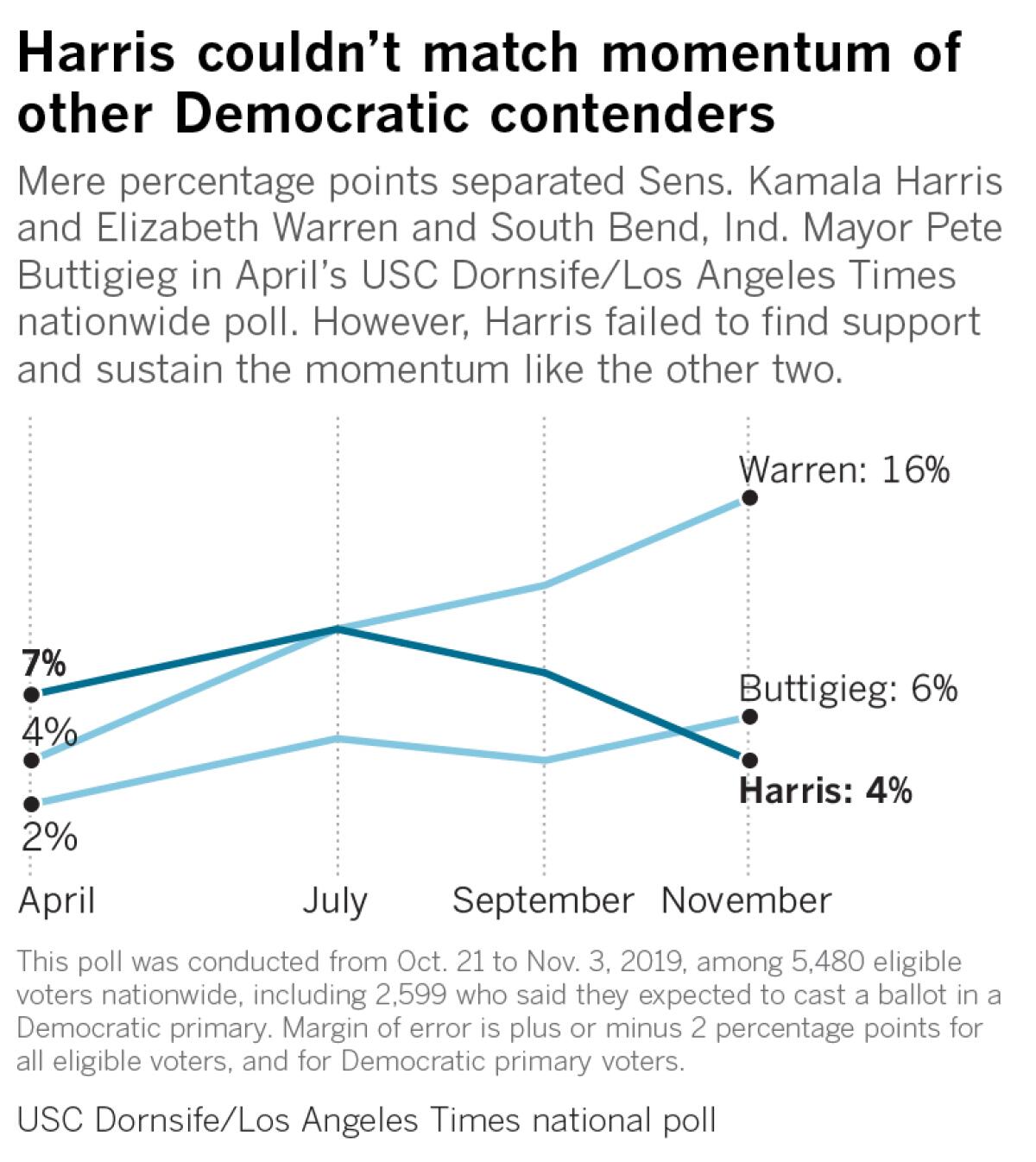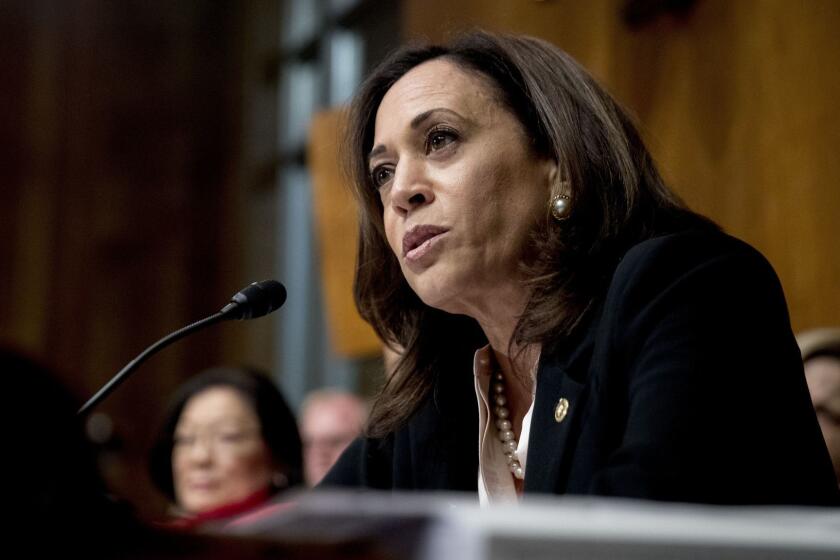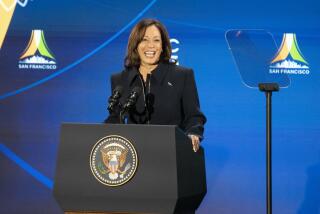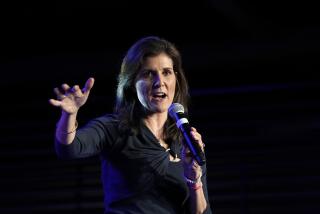Kamala Harris drops out of the presidential race

Sen. Kamala Harris cited money troubles as she abandoned her campaign for president.
Kamala Harris suspended her presidential run Tuesday, marking a lackluster end to an initially soaring presidential bid premised on the California senator’s personal biography and prosecutorial acumen. Ultimately, her run foundered with a muddled purpose, campaign infighting and an inability to sustain support from vital Democratic voting blocs, particularly African Americans.
In an email to supporters, Harris blamed her campaign’s end on a lack of money.
“I’m not a billionaire. I can’t fund my own campaign. And as the campaign has gone on, it’s become harder and harder to raise the money we need to compete,” she wrote. “In good faith, I can’t tell you, my supporters and volunteers, that I have a path forward if I don’t believe I do. So, to you my supporters, it is with deep regret — but also with deep gratitude — that I am suspending my campaign today.”
The freshman senator entered the race as a rising star, representing the more youthful and diverse voters that have become the Democratic Party‘s base. Her sharp interrogations of Trump administration officials in Senate hearings had made her one of the highest-profile members of Congress. Her polished campaign launch put her firmly into the top tier of a crowded Democratic field.
But Harris, 55, struggled to articulate a distinct rationale for her candidacy. Dropping in the polls and struggling to raise money, she tried to regroup in October, slashing staff at her Baltimore campaign headquarters for a last-ditch push to win over Iowa, a state she’d initially placed little emphasis on in her strategy for capturing the Democratic nomination.
Harris, who campaigned in Iowa over the Thanksgiving weekend, made the decision to abandon the race on Monday after reviewing the path forward with her family and senior aides, according to an advisor. Among the factors weighing on her were the vast spending on television ads by new Democratic rival Michael R. Bloomberg, the billionaire and former New York mayor, and the difficulty she would face getting her message out in January during the likely impeachment trial of Trump in the Senate.
Fellow Democratic contenders, including some of Harris’ most spirited sparring partners, reacted with praise.
Former Vice President Joe Biden, whom Harris laced into in the first Democratic debate in June over his opposition to school busing in the 1970s, lauded her as “a first-rate intellect, a first-rate candidate and a real competitor.”
“I have mixed emotions about it, because she is really a solid, solid person and loaded with talent,” he told reporters during a campaign stop in Iowa.
South Bend, Ind., Mayor Pete Buttigieg, whose success with big-dollar donors ate into Harris’ fundraising base, wrote on Twitter that Harris “has spent her career advocating for the voiceless and the vulnerable. I am grateful for her leadership and the courage she brings to the Senate and the national debate. I know she will continue to fight fearlessly on behalf of the American people — and our democracy.”
Born in Oakland and raised mainly in Berkeley, Harris is the daughter of immigrants: Shyamala Gopalan, who was a breast cancer researcher from India, and Donald Harris, a Jamaican economist who taught at Stanford University.
Her biracial background was initially seen as a major asset at a time when African Americans, Latinos and Asians are important blocs in the Democratic coalition. But Harris’ uneven performance in the campaign, especially her fumbling on healthcare, drove her poll ratings down and she never recovered.
An early supporter of “Medicare for all,” a touchstone for progressive candidates, Harris said in January that she wanted to eliminate private health insurance, but then quickly backed away from that position, leaving many voters unclear on where she stood. When she released her full healthcare agenda months later, her failure to explain it clearly on a debate stage raised still more doubts about how she would approach this top issue for many Democrats.
When Kamala Harris launched her presidential bid four months ago, the stars all seemed to align.
Harris has never lost an election. A career prosecutor, she won her campaign for San Francisco district attorney in 2003, then state attorney general in 2010. She captured her U.S. Senate seat six years later and quickly made a name for herself as a sharp interrogator of Trump administration appointees, including former Atty. Gen. Jeff Sessions.
According to a new poll, a majority of California Democrats wanted Harris to drop out of the race. The poll, conducted by the Berkeley Institute of Governmental Studies for the Los Angeles Times, showed that by 61% to 24% likely Democratic primary voters in California thought Harris should quit the race.
Harris’ support in the state had steadily slipped, and she was the first choice of only 7% of the state’s Democratic primary voters, according to the poll. Judging by the second choices of her supporters, Biden and Sen. Elizabeth Warren would be the likely main beneficiaries of her withdrawal, at least in California, which holds its primary on March 3.

In recent months, Harris’ campaign was rocked by reports of internal dissent and dwindling funds. Still, the decision to drop out was abrupt. Just one day earlier, her campaign announced that California Gov. Gavin Newsom, a longtime political ally, would stump for her in Iowa later in December. And a pro-Harris super PAC planned to spend at least $1 million to run television commercials in Iowa trumpeting her as the Democrat most feared by President Trump. The group canceled the ad buy Tuesday morning.
Times staff writer David Lauter in Washington contributed to this report.
More to Read
Get the L.A. Times Politics newsletter
Deeply reported insights into legislation, politics and policy from Sacramento, Washington and beyond. In your inbox three times per week.
You may occasionally receive promotional content from the Los Angeles Times.









